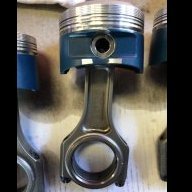Announcements
-
Similar Content
-
Latest Posts
-
Did some baking today, managed to fit it all in the oven. Turned out pretty good. Hopefully it holds up well to a bit of tool abuse. Popped a few pieces on to see what the colours will look like. Pretty happy with how it came up. Now to wait for the rest of the stuff to rock up
-
A creative mounting location would be from the roof. We totally need to bring back ludicrous stereo designs from AutoSalon days...
-
I could show you guys photos of wrap having been removed properly, and where the wrap was removed, paint underneath is perfect. Sections of the vehicle didn't have wrap on it, and in those areas, the paint work is destroyed because of how long it had been sitting in the hot QLD sun for many many many years. Wrap even still looked decent. Good quality wrap, and removing it properly shouldn't rip off the paint work, unless the paintwork was already shot to pieces before hand.
-






Recommended Posts
Create an account or sign in to comment
You need to be a member in order to leave a comment
Create an account
Sign up for a new account in our community. It's easy!
Register a new accountSign in
Already have an account? Sign in here.
Sign In Now